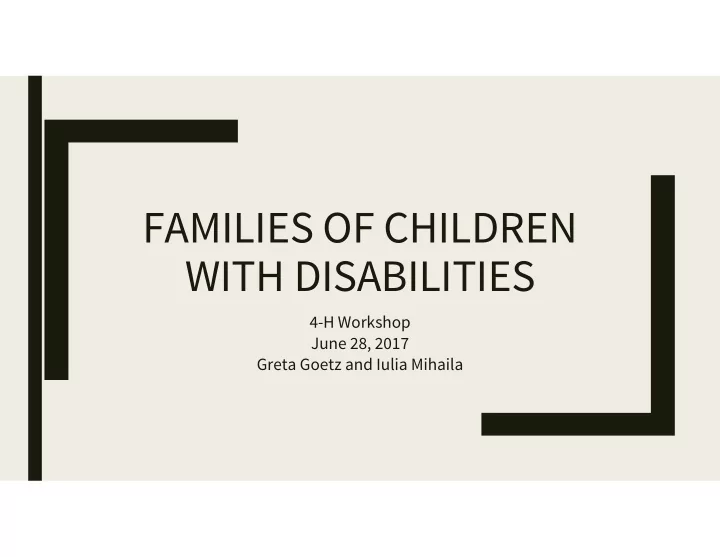

FAMILIES OF CHILDREN WITH DISABILITIES 4-H Workshop June 28, 2017 Greta Goetz and Iulia Mihaila
Introductions
Greta Goetz -B.S. in Human Development and Family Studies -[Almost] M.S. in Human Development and Family Studies
Iulia Mihaila - B.A. Psychology - Minors in Statistical Sciences and French This image cannot currently be displayed. - M.S. Human Development and Family Studies - [Almost] Ph.D. in HDFS
In small groups... ■ Where are you from? ■ What is your favorite school subject? ■ What is your favorite hobby? ■ If you were an animal, what would you be? ■ Why are you interested in this workshop?
What is a developmental disability? ■ Caused by mental or physical impairment. ■ Starts before age 22 and is expected to continue the entire life. ■ Causes limitations in three or more of the following areas: – self-care. – language. – learning. – mobility. – self-direction. – independent living. – ability to have a job.
Examples ■ Autism ■ Behavioral disorders ■ Traumatic brain injury ■ Cerebral Palsy ■ Down syndrome ■ Fetal alcohol syndrome ■ Intellectual disability ■ Spina bifida
Wisconsin ■ 18.4% (753,000 people) of adults have a developmental disability ■ 14.1% of students have a disability ■ 1.16% of children have autism spectrum disorder ■ 1.07% of students have intellectual disability ■ 0.05% of students have a traumatic brain injury
Pair Up & Share How have you encountered disabilities in your lives?
Group Share How have you encountered disabilities in your lives?
Research Family Systems Theory and Family Outcomes in ASD
Family ■ Family members create one family unit. Systems Theory ■ Family members influence other family members. ■ The environment influences the family This image cannot currently be displayed. and the family influences the environment.
Family Outcomes in ASD Autism Spectrum Disorder: social and communicative difficulties, restrictive interests, and repetitive behaviors. ■ Often experience other behavior problems ■ Occurs in about 1:68 children Research Study: examining parenting and the marital relationship in families that have a child with autism.
Joys & Challenges of Parenting Joys ■ Family feels more connected ■ More patience and compassion ■ Feel proud when they accomplish something ■ More laughter Challenges ■ Less sleep ■ Meltdowns in public ■ Managing behavior problems ■ Lots of paperwork and doctor appointments ■ Financial stress
Five-Minute Speech Sample Prompt : “Now I’d like to hear about Johnny, in your own words and without my interrupting with any questions or comments. When I ask you to begin, I’d like you to speak for five minutes, telling me what kind of person Johnny is and how the two of you get along together. Once you begin to speak, I prefer not to answer any questions until after the five mintues.”
Group Share What do you expect parents to say?
Listen!
Group Share ■ What surprised you? ■ What did you hear that was interesting?
Practice Potential Career Opportunities and Paths
Serving Families of Children with Disabilities - Special Education Teacher - Occupational Therapist - Physical Therapist - Speech and Language Pathologist - Clinical Psychologist and Social Worker - Child Life - Physician Assistant - Behavior Analyst
Applied Behavior Analysis ■ Behavior analysis: evidence-based approach to understanding how one’s behavior is affected by one’s environment. ■ Behavior: one’s actions and skills. ■ Environment: any influence (social or physical) that may change or be changed by one’s behavior. ■ ABA uses these techniques to bring about meaningful and positive change in behavior.
Continued. ■ Use positive reinforcement to reward behaviors. ■ When a behavior is followed by a reward, the behavior is more likely to be repeated. ■ ABA techniques can result in improvements in communication, social relationships, play, self care, school, and employment. ■ Young children with autism often receive comprehensive, individualized, early intervention using ABA techniques. Intro to Intensive Teaching
Teaching Example! Example
Group Activity! What surprised you? What questions do you still have?
Recommend
More recommend